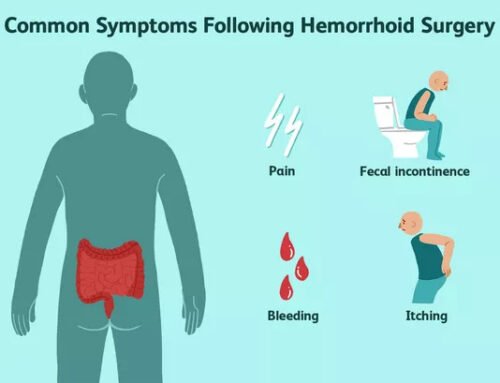
What is a Hemorrhoidectomy Surgery? Why Is It Done?
Haemorrhoids, a condition that results in swollen veins in the anus and lower rectum causing itching, bleeding and pain, is quite prevalent throughout the population. Although most symptoms can be neutralised with minor lifestyle changes and over the counter medication, severe haemorrhoids can quickly escalate into something that impacts the patient's quality of life. If nothing else seems to work and you have tried every other non invasive option then maybe it's time to inquire about the hemorrhoidectomy surgery procedure with your doctor.
Simply put, hemorrhoidectomy surgery is a safe and effective treatment / procedure to remove haemorrhoids. Although surgery is not an initial method of treatment, when severity calls for one, a hemorrhoidectomy surgery is recommended because getting rid of such discomfort is far better than finding a way to live with it.
Procedure For Hemorrhoidectomy Surgery
Hemorrhoidectomy surgery is typically an outpatient procedure, but it may require an overnight stay in some cases. The patient is prohibited from eating or drinking 6 to 8 hours prior to the surgery. An IV is then given for medications to prevent infection, swelling, and bleeding. Either general or local anaesthesia with sedation is used to help the patient sleep through the procedure.
Once the patient is asleep, the surgeon inserts a scope into the anal canal for closer examination of internal hemorrhoids. Next, hemorrhoidal tissue is cut with a scalpel or laser and the wound is closed off with dissolvable sutures. This is called a closed hemorrhoidectomy surgery. However, in cases with higher risk of infection or when the affected area is very large, the incision isn't sutured and now it is called an open hemorrhoidectomy surgery.
Once the surgery is over, the patient is monitored for a few hours for stable vitals. They can drink and eat soon afterward and within a few hours they can get out of bed and be discharged when they are stable.
Need for hemorrhoidectomy surgery
Unless the symptoms of haemorrhoids start affecting the quality of life of the patient, surgical or invasive procedures are usually not being considered. Such symptoms can include bleeding, pain and discomfort maintaining anal hygiene. The primary objective of a hemorrhoidectomy surgery procedure is to relieve such symptoms, especially for those who have not adequately responded to conservative and non-invasive treatment. Since they are not a life-threatening condition, haemorrhoids are usually controlled by simple changes in habits such as consuming a diet with considerable fibre content and over the counter (OTC) medicines. Surgical options are almost always kept as a last resort. Hemorrhoidectomy surgery procedure is typically recommended for removing large internal hemorrhoids which might further lead to mucus discharge or fecal leakage as they prolapse through the anal canal. Additionally, consistent irritation of the perianal skin can also result in severe itching (pruritus). Internal Hemorrhoids can even become gangrenous when their blood supply is cut off (strangulated).
Laser Hemorrhoidectomy Surgery
A Laser Hemorrhoidectomy Surgery, technically also referred to as a Laser hemorrhoidoplasty, is a relatively modern procedure for treating haemorrhoids. During a Laser Hemorrhoidectomy surgery, a high energy beam of highly focused laser is used to coagulate the hemorrhoidal blood flow. The patient is usually sedated before the procedure, which involves inserting a laser probe into the haemorrhoids, by an experienced coloproctologist or a colorectal surgeon. The intense heat from the laser beam cauterises and seals off the hemorrhoidal blood vessels, thus shrinking the hemorrhoid while reducing the risk of excessive bleeding during and after the procedure. Additionally, since laser hemorrhoidectomy surgery is a highly precise procedure, it leaves the surrounding tissues as well as the anal sphincters unaffected.
If you are having second thoughts about this technique being relatively new, then you must also take into consideration the following advantages of Laser Hemorrhoidectomy Surgery.
- A major concern related to any surgery is the extent of loss of blood. Since this particular procedure uses Laser as the operating tool, it results in partially sealing off of the blood vessels and which, in return, results in almost negligible loss of blood. Moreover, this sealing off also brings down the risk of infection exponentially.
- Laser Hemorrhoidectomy Surgery, typically, is far less painful when seen in comparison to other incision based techniques that use scalpels. Though the surgery is conducted under local anaesthesia in both techniques, the patient starts to feel the pain as and when the effect wears off. This pain, in case of a laser based surgery, is far too less than its incision based counterpart.
- Reduced surgery time is yet another major plus point for Laser Hemorrhoidectomy Surgery when compared to incision based techniques. Depending upon the location and density of hemorrhoids, a typical surgery takes merely 30 to 45 minutes. In most cases, the patient does not even need to be admitted and is allowed to go home soon after the surgery.
- Accelerated Recovery is one of the most sought after post surgery requisites and Laser Hemorrhoidectomy Surgery falls right in place as reduced blood loss, lower possibilities of infection and partial sealing of tissues during surgery all lead to a much faster recovery time. In most cases, patients are able to resume their daily chores within a week after surgery. Such an advantage can go a long way in enhancing their quality of life post surgery.
So it does not matter what method you would prefer to get your haemorrhoids removed, the first step is always to consult your doctor or anorectal surgeon as soon as you start observing any symptoms.



